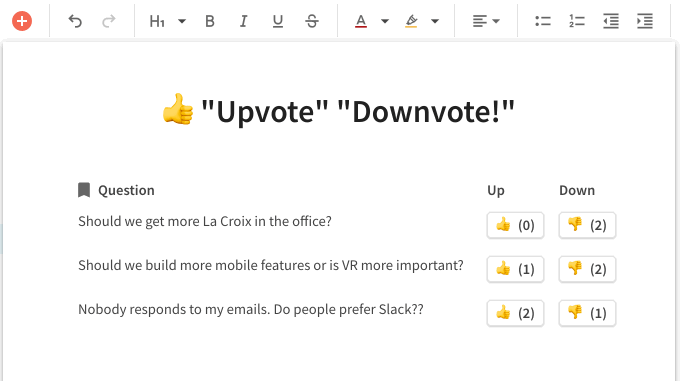This post originally appeared on the Remote-how blog.
Prior to joining Coda, I had never worked remotely for a company.
In my previous role, I would work from home every now and then, but for the most part I was expected to show up to the office, attend meetings I didn’t really want to attend, and then get work done at my desk. I had the opportunity to freelance and work on my own projects, and with that came the responsibility of setting my own hours and getting work done. For most independent consultants and freelancers out there, you are working remotely but don’t have a bigger team to answer to (unless you are working on-site for a specific client).
Being a freelancer taught me a lot about routines, discipline, and knowing how to structure my days, weeks, and months. It didn’t teach me how to work with a broader team that is collocated in a different city. I want to share 5 tips on how to be successful when joining a company as a remote worker for the first time in your career.
1) Visit the team in person often

Nothing beats meeting your team in person and building real relationships. When I first started, I tried to visit our offices on the west coast as often as I could (I’m based in NYC). My first day was actually at an internal hackathon where the entire team gets together and works on brand new ideas that may eventually get built into the Coda platform. During the hackathon, I had a chance to meet almost everyone on the team in a somewhat stressful environment (true to the spirit of hackathons, we work on ideas for 2-3 days straight). During those few days, I got a chance to meet and work with my new teammates so that they could understand my working style.
Every month or so, I would fly back for company events or just to work alongside my team. When you’re a new remote worker and don’t make an effort to meet your team in person, your teammates will only know you through Slack and on video conference calls. Taking the time to build relationships with your team members up will engender more trust and productivity down the road.
2) Be vocal through documentation
All remote workers don’t have the opportunity to have “water cooler” conversations that their collocated colleagues have. These informal conversations can create clarity for a business issue and creates more collaboration between team members. Since you can’t regularly have these hallway conversations, you have to be a little more vocal through digital means. This means e-mail, Slack, and for me, Coda.

Aside from leaving feedback via Slack and e-mail, I use Coda heavily to upvote/downvote questions I have about projects, document the status of projects, and more. The various company-wide Coda docs we have set up allows for transparent sharing of company information and gives anyone in the company to voice their opinions and feedback. I use our various Coda docs in real time during meetings so that the meeting leader can see any questions or feedback I’m typing in as the meeting progresses.
3) Get a high quality webcam and mic
This is a logistical aspect of being a new remote worker but many people decide to put convenience over quality. It’s easy to the headphones you already use with your iPhone or Android phone into your laptop and start getting on Zoom calls. On the other side where your entire team is watching and listening, the quality can come out really bad. You don’t want to be the one person on all Zoom calls where the audio and video quality is bad and people just want you to mute your mic.

One of my favorite podcasters is Jason Calacanis and he has some very strict rules for his team on how to handle video conferences. If someone on his team is dialing in remotely, he requires them to have a headset with a stick mic, a webcam that gets plugged into their computer, and have a wired Ethernet connection. All these precautions help ensure good video and audio quality. You can get $20 headsets on Amazon that have amazing audio quality. I’ve been using this one for the last 2 years and it works perfectly.
4) Join IRL communities
Related to tip #2, you won’t have the opportunity for in-person lunches or happy hours that often with your team. Instead, I’ve opted to join in-person communities in my city to get that social interaction that comes with being a part of a team. For instance, at my co-working space (WeWork), I started going to events and meeting people that work near me to have some “work friends” even though they are not a part of my company. I created a meetup for Coda users in NYC and it’s helped me 1) meet others who have similar interests and 2) educate people about Coda.

In addition to starting your own community or meetup, make it a point to join other meetups with other like-minded people. There are most likely many remote work meetups where people who are new to remote work can discuss strategies for succeeding as a remote worker (including the tips from this article!).
5) Set boundaries for work and personal life
A common theme that comes up again and again in the remote work world is mental health. When you’re working in an office, everyone checks out at a certain time of the night and activity on Slack and e-mail slowly die down. As a new remote worker, you may be working in a new timezone, and may be adjusting to the new meeting times that don’t fit within a traditional 9-to-5. It’s really important to set boundaries for when work begins and ends for you because of the flexibility remote work gives you.
This is especially true if you don’t have a co-working space or separate office, and you work from home. If it’s getting close to dinner time and you’re still working, what’s preventing you from ordering takeout and just eating at your desk? The barrier to doing this is super low and before you know it, you’re working right up until you go to sleep. Avoid the burnout that many remote workers face when they don’t have a grasp on the number of projects they can take on. Your mental and physical health should be your number one priority!
Hopefully these tips will help you succeed as a new remote worker. If you have any questions or comments, feel free to leave them below!



Top comments (1)
As a person looking for remote work, this was super helpful. Thank you!